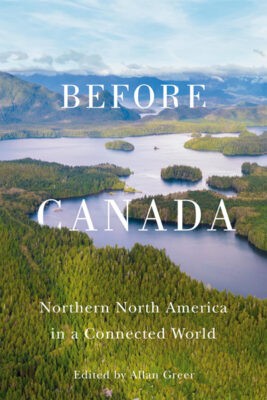Reading a good piece of scholarship is a lot like cooking a challenging dish – while the process is viscerally active, demanding every ounce of one’s attention, the final result is immensely satisfying if not wholly enlightening.

Before Canada
Northern North America in a Connected World
Allan Greer
McGill-Queen's University Press
$44.95
paper
426pp
9780228019213
From this savvy introduction, the chapters of Before Canada traverse academic disciplines as well as the various landscapes of what we now call “Canada.” One of the more engaging studies early on is Université de Montréal professor Brad Loewen’s retelling of Basque-Indigenous-French connections at the Gulf of Saint Lawrence. Loewen illustrates this network by way of the chaloupe, a long-boat common throughout New France whose origins lie in the Basque boat known as a txalupa. Introduced to First Nations groups around the gulf by Basque fishermen, the txalupa serves as a symbol of the international networks at play, with Loewen’s anthropological research illuminating how these same Indigenous communities moved by txalupa between the French hubs of Tadoussac, Gaspé, Percé, and Miscou.
The next chapter departs from the realms of anthropology to a literary scholar intrigued by maps. MIT professor Mary C. Fuller shows how early globes were constructed by long-distance and cross-national exchanges of ideas, demonstrating the usefulness of a close reading beyond the realm of overtly “literary” texts. In doing so, Fuller helpfully demonstrates the transferability of literary training to other disciplines (in this case, geography).
But while some authors in Before Canada put their revelatory insights on clear display, others sadly shroud theirs behind flowery language and academic jargon. Jack Bouchard (Rutgers) also writes his chapter on European fishers around Newfoundland in the early sixteenth century, but hides his most interesting thoughts behind inaccessible language. When discussing the reason European fishers found themselves in around Newfoundland at the turn of the century, he brings up the Little Ice Age, a period of relatively cool temperatures across Western Europe, that negatively impacted agriculture efforts and pushed the search for sustenance to the seas. Instead of introducing the phenomenon in plain language, Bouchard refers to “the climate anomaly known as the Spörer Minimum,” which certainly made this reviewer’s eyes glaze over.
But while some early points in the book struggle to impress, perseverance is rewarded, and before you know it, Before Canada builds to a dramatic crescendo of decolonial research. Oxford French professor Katherine Ibbett offers an elegantly written reading of literary “drowning” narratives in New France, invoking Christina Sharpe’s notion of reading “in the wake.” And Christopher Parsons of Northeastern ends the book by calling for a decolonial turn in Early Canadian studies, revealing the malevolent roots of Canada’s mythmaking project by shining a scrutinous eye on our most prized national icons: the beaver and the maple tree.
Taken together, the chapters of Before Canada represent a dynamic discipline in flux, with a healthy balance of new- and old-guard thinking. While every reader may not enjoy the whole pie, most would be remiss to not indulge in a slice.mRb






0 Comments